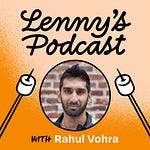Brought to you by:
• Explo—Embed customer-facing analytics in your product
• Vanta—Automate compliance. Simplify security
• LinkedIn Ads—Reach professionals and drive results for your business
—
Dharmesh Shah is the co-founder and CTO of HubSpot (currently valued at $30 billion) and one of the most fascinating founders I’ve ever met. Dharmesh is the keeper of HubSpot’s Culture Code, built ChatSpot (an AI chatbot built on top of HubSpot CRM) and a game called WordPlay (which grew to 16 million users), and also founded and writes for OnStartups, a top-ranking startup blog and community with more than 1M members. He’s also invested in 100+ startups including OpenAI, AngelList, Coinbase, and Dropbox. In our conversation, we discuss:
The biggest lessons he has learned from building HubSpot
The importance of leaning into your strengths
Dharmesh’s data-oriented approach to public speaking
How he developed HubSpot’s culture code
The decision-making process at HubSpot
His contrarian approach to building products
Why founders and product teams are all fighting the second law of thermodynamics
How “flash tags” can save your teams time
How to decide what ideas are worth investing in
Some takeaways:
Acknowledge your strengths and limitations candidly. Delegate tasks you don’t excel in or enjoy, or structure your role to minimize exposure to them. For example, Dharmesh knows that he isn’t adept at managing people, and made a conscious decision to avoid having direct reports. This decision not only allowed him to focus on what he excelled at but also contributed to his personal satisfaction and the success of the company.
By adopting a systematic and data-driven approach to preparing and delivering presentations, you can effectively refine your skills and increase your impact as a speaker.
Define your metrics: Identify specific metrics that matter to you. For example, Dharmesh measures “laughs per minute” (LPM), a metric commonly used by stand-up comedians.
Measure and analyze: Record your presentations and analyze them using tools or methods to measure the identified metrics—in this case, transcribing the talks and using custom software to track moments when the audience audibly laughs.
Set goals: Establish benchmarks and goals for improvement based on your metrics. For instance, aim for a minimum LPM and strive to increase it over time.
Iterate and improve: Experiment with different approaches to see what increases audience engagement, whether it’s incorporating more humor, adjusting pacing, or refining content structure.
Continuously learn: Keep learning and adapting your approach based on feedback and results. Stay open to new techniques and insights that can further enhance your presentation skills.
Treat your company culture like a product, where your employees are the customers. Rather than preserving the established culture, founders should iterate on cultural principles and values to meet the evolving needs of a growing team. Document, iterate, and clarify cultural elements to reflect past, present, and future aspirations.
HubSpot uses a “flashtag” framework to convey the strength of feedback. Each tag corresponds to a different level of commitment:
“#fyi” indicates a passing idea without expecting a response
“#suggestion” offers advice to be considered but doesn’t require action
“#recommendation” implies a well-thought-out proposal that deserves attention and a reasoned response
“#plea” demands compliance or at least discussion of the option
HubSpot uses the “debate, decide, unite” framework for consensus-based decision-making. After debating and deciding, securing buy-in from all team members—including dissenters—promotes shared ownership and commitment toward common goals. HubSpot’s contrarian decision to build “miles wide and inches deep” addressed a genuine pain point, and they thrived in a less crowded space. HubSpot recognized that SMBs often face complexity in managing multiple tools and workflows, so HubSpot simplified their lives with an all-in-one platform.
Champion simplicity amid complexity. Leaders must combat the natural complexity increase over time (the second law of thermodynamics) by prioritizing simplicity at all stages. Adopt strategies like HubSpot’s “one in, one out” rule, ensuring balance and preventing unnecessary complexity.
Employ the 4P framework when assessing new ventures for informed decision-making:
Potential outcome: Evaluate the potential impact, revenue, market cap, or personal significance of the idea on a scale of 0 to 10. Quantifying the potential outcome helps in making informed decisions.
Probability of success: Assess the likelihood of the idea succeeding, considering various factors such as market demand, competition, and execution capabilities. Avoid the common mistake of solely focusing on probability without first considering the potential outcome.
Passion or proximity: Reflect on your level of interest and proximity to the problem or market segment the idea addresses. While passion is important, it’s okay if it develops over time rather than being the initial driving force.
Prowess or unfair advantage: Identify any unique assets or advantages you possess that could increase the likelihood of success. This could include existing code, market access, or specialized knowledge.
Listen now on Apple, Spotify, Overcast, and YouTube.
Where to find Dharmesh Shah:
• X: https://twitter.com/dharmesh
• LinkedIn: https://www.linkedin.com/in/dharmesh/
• Website: https://dharmesh.com/
Where to find Lenny:
• Newsletter: https://www.lennysnewsletter.com
• X: https://twitter.com/lennysan
• LinkedIn: https://www.linkedin.com/in/lennyrachitsky/
In this episode, we cover:
(00:00) Dharmesh’s background
(04:20) Fun facts about Dharmesh
(06:31) His data-oriented approach to public speaking
(11:45) Advice for adding humor to your presentations
(15:28) Why he has no direct reports
(18:46) You can shape the universe to your liking
(20:02) Lessons from building HubSpot
(23:43) Contrarian ways of running a company
(37:26) Fighting the second law of thermodynamics
(40:29) The importance of simplicity in running a business
(45:22) Succeeding in the SMB market
(50:29) Zigging when others are zagging
(54:17) When it makes sense to go “wide and deep”
(57:33) Using flashtags to communicate opinions
(01:02:44) HubSpot’s decision-making process
(01:09:41) Deciding what ideas to invest in
(01:15:26) Defining and maintaining company culture
(01:30:46) The potential of AI
(01:37:03) Practical advice for learning AI
(01:40:07) Where to find Dharmesh
Referenced:
• WordPlay: https://wordplay.com/article/unlimited
• ChatSpot: https://chatspot.ai/
• Indian-origin entrepreneur buys ‘chat.com’ for over $10 million, then sells, donates $250,000 to Khan Academy: https://www.businesstoday.in/technology/news/story/indian-origin-entrepreneur-buys-chatcom-for-over-10-million-then-sells-donates-250000-to-khan-academy-382907-2023-05-26
• Kipp Bodnar on LinkedIn: https://www.linkedin.com/in/kippbodnar/
• The surprising metric presenters should analyze: https://lars-sudmann.com/the-surprising-metric-presenters-should-analyze/
• Brian Halligan on LinkedIn: https://www.linkedin.com/in/brianhalligan/
• First Principles: Elon Musk on the Power of Thinking for Yourself: https://jamesclear.com/first-principles
• Peter Thiel on LinkedIn: https://www.linkedin.com/in/peterthiel/
• The second law of thermodynamics: https://en.wikipedia.org/wiki/Second_law_of_thermodynamics
• What is an SMB?: https://www.techtarget.com/whatis/definition/SMB-small-and-medium-sized-business-or-small-and-midsized-business
• Shopify: https://www.shopify.com/
• Relentless curiosity, radical accountability, and HubSpot’s winning growth formula | Christopher Miller (VP of Product, Growth and AI): https://www.lennyspodcast.com/relentless-curiosity-radical-accountability-and-hubspots-winning-growth-formula-christopher-mil/
• FlashTags: A Simple Hack for Conveying Context Without Confusion: https://www.onstartups.com/flashtags-a-simple-hack-for-conveying-context-without-confusion
• What it means to “disagree and commit”: https://news.ycombinator.com/item?id=16949021
• A Simple Decision Framework: Debate, Decide and Unite: https://connectingdots.com/p/debate-decide-unite
• Dharmesh Shah’s Frameworks for Creating a $1 Billion Net Worth: https://hakune.co/dharmesh-shah-networth/
• Zip: https://ziphq.com/
• The HubSpot Culture Code: Creating a Company We Love: https://blog.hubspot.com/blog/tabid/6307/bid/34234/the-hubspot-culture-code-creating-a-company-we-love.aspx
• How defining values and culture helped Airbnb achieve worldwide success: https://lattice.com/library/how-defining-values-and-culture-helped-airbnb-achie
• What is SQL?: https://aws.amazon.com/what-is/sql/
• GrowthBot: https://community.hubspot.com/t5/Releases-and-Updates/Meet-GrowthBot-from-HubSpot-Labs/ba-p/417985
Production and marketing by https://penname.co/. For inquiries about sponsoring the podcast, email podcast@lennyrachitsky.com.
Lenny may be an investor in the companies discussed.















Share this post